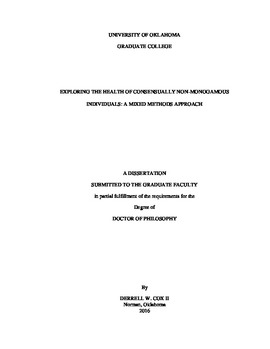| dc.description.abstract | This study uses mixed (quantitative, qualitative, and ethnographic) methods and a multiple-theoretical framework, especially sexual configurations theory, to examine the health of cross-sectional samples of persons who engage in alternative sexualities, especially consensual non-monogamy (CNM), and compares their health, happiness, educational attainment, sexual frequency, sexual health knowledge, marital happiness, experiences of discrimination and other adversities, and other variables with cross-sectional samples from the general US population. For those who are so oriented, CNM within current human populations unite local sociocultural values and contexts with human sexual plasticity evolved from ancient times, and these behaviors are associated with holistic health, which is fostered within intentional communities that provide supportive spaces where persons who engage in alternative sexualities may thrive, experience conditions for optimal health, happiness, relationship satisfaction, sexual health, protection, and resilience in the midst of oppressive and deleterious forces exerted by some individuals and institutions in majority society and their attempts to flatten and erase human sexual diversities. The findings presented herein indicate that those who are actively CNM are more educated, have more frequent sexual interaction, with more partners, and are as happy and healthy (and in most cases happier and healthier), happy in their marriages (and frequently happier), and are more attentive to their sexual health than are individuals from the general US population. These findings hold generally true across the lifecourse, across genders and marital status, and among various behavioral sexual orientations. | en_US |

